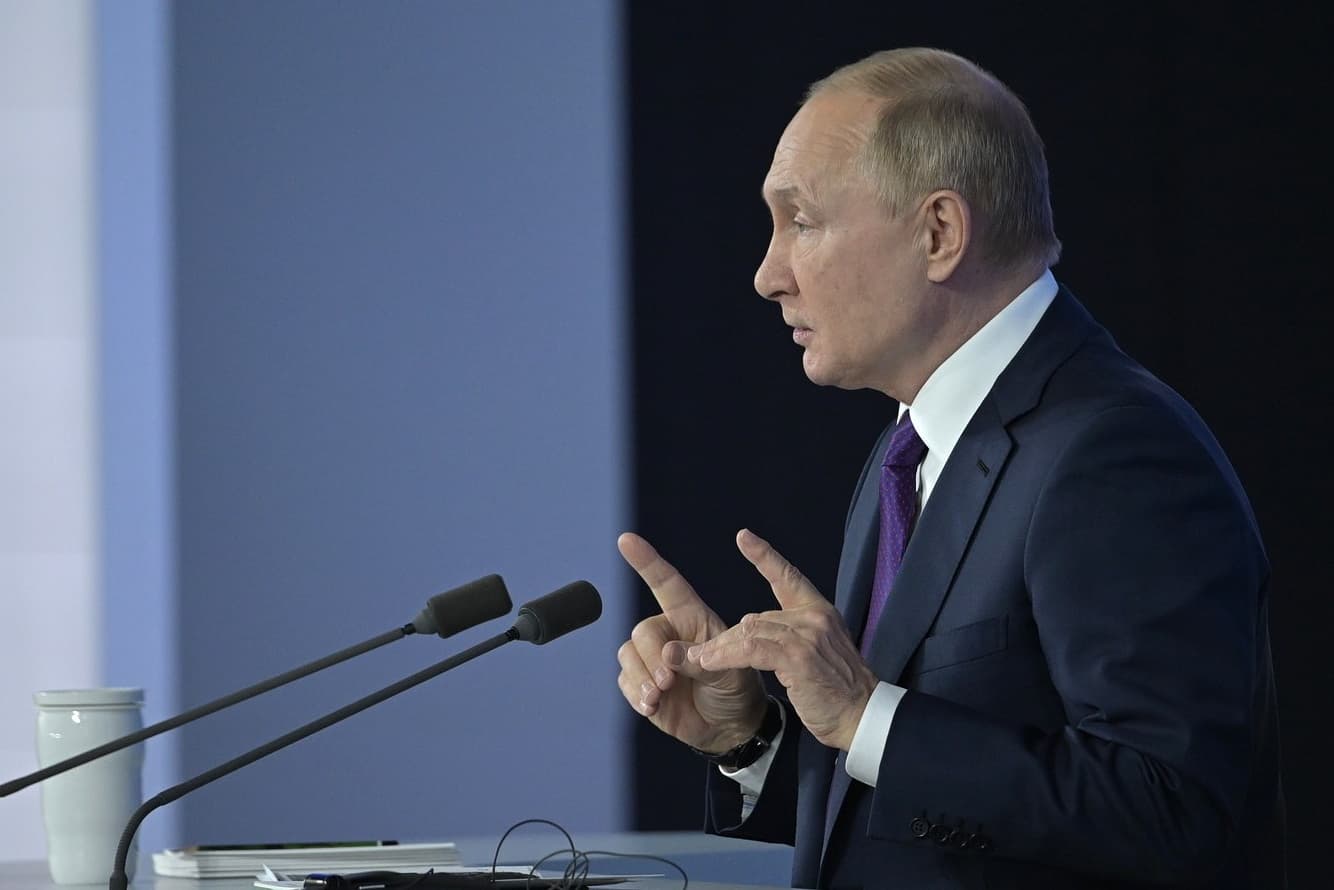Timothy Ash: Putin is preparing for war

I have certainly put myself out there as having the most hawkish view on Russia (compared to the street consensus), but I still find it difficult to see anything but escalation by Russia with Ukraine from the current postures.
Why?
First, I just don’t see much room for compromise between the two sides.
Moscow has in recent weeks clearly set out its wish list in terms of what it would want from any security settlement with the West. These demands include:
- No further NATO enlargement, including to Ukraine and Georgia, but also to the likes of Finland and Sweden;
- No NATO deployments/training exercises in former Soviet Union states like Ukraine and Georgia;
- No NATO deployments to member states which joined the organization after 1997, so the likes of Poland and the Baltic states (which would in effect become second class NATO members);
- No re-armament of Ukraine, in effect Russian President Vladimir Putin is arguing for Ukraine to be put back into Moscow’s strategic orbit, or de facto rendered unable to defend itself and hence put at the mercy of Moscow which has shown its willingness to militarily intervene in Ukraine when it previously had little defensive military capability (2014-2015);
- No deployment of U.S. nuclear weapons outside of the U.S. – so a pull back from Europe;
- No deployment by NATO of short or intermediate range nuclear missiles within strike range of Moscow.
In the weeks leading up to the meetings this week the U.S. hinted of a possible compromise, in terms of offering further U.S. troop withdrawals from Europe – but this seemed to generate a furious/concerned response from Europe, which appeared unnerved if this meant a reduced U.S. commitment to European security. The U.S. subsequently appeared to backtrack.
And this week we have appeared to see the crystallisation of the Western/NATO response to Russian demands which has been that the West will not be forced to concede ground due to Russian bullying, and that Russia needs to first pull its 100,000 troops from the border with Ukraine, before any deal/concessions are possible. But even then the West has made clear that Russia has no veto on NATO enlargement, and that countries like Ukraine and Georgia have still a route to NATO membership, but it is up to NATO and the prospective members to determine membership, or not, not Russia.
The Russian demand for NATO to withdraw troops from post-1997 NATO members has been met with incredulity, especially from the 97+ new entrants.
Even the demand for no NATO deployment to former Soviet Union states/re-armament of Ukraine has received short shift, with the view being that these states have the right to be able to defend themselves, and that is all that NATO is doing – it is not giving them offensive military capability. Indeed, if one considers Ukraine, it had little defensive capability in 2014, and yet this did not discourage Russian annexation of Crimea or military intervention in the Donbas. The view hence is that well if non-aligned/non-armed in effect status in 2014 did not work, these states might as well be helped to build capacity to defend themselves, and indeed, this is the best defence for NATO against future Russian aggression.
So herein on the Russian wish list above, on the security-related agenda, it's hard to see much/any room for compromise.
Second, the focus this week has very much been on the security agenda, but it's hard to get away from the basic fact that the current crisis centres on Ukraine, and Putin’s difficulty in accepting the results of the EuroMaidan Revolution in 2013-2014.
I think Latvian Prime Minister Arturs Krišjānis Kariņš summed things up very well this week when he quipped that “Moscow is not afraid of NATO forces but Ukrainian democracy.”
Moscow talks a lot about security risks from NATO and Ukraine, but again it is worth restating that Russia annexed Crimea in 2014, and militarily invaded the Donbas, resulting in nearly 14,000 deaths when Ukraine back then had no NATO ambitions (opinion polls showed single-digit support), limited capability (seen by the fact Crimea was annexed in a weekend, and Ukraine’s heavy military defeats in Illovaisk et al in 2014-2015) – it had a tough time defending itself against the Russian-backed assault in the Donbas only halted by the Franco-German peace effort which resulted in the Minsk 2 peace plan, but also Ukraine’s military doctrine back in 2014 was aimed Westwards, not against Russia.
Putin cares about Ukraine – so much so that he wrote a 5,000-word essay on Ukraine over the summer where he challenged Ukraine’s very right to exist. I think what is clear from Putin’s actions that he cares deeply about Ukraine and you can take the annexation of Crimea, the invasion of the Donbas, efforts to diversify trade and energy transit/supply away from Ukraine, cyberattacks, the $3 billion Eurobond dispute in London courts, as all part of an agenda to undermine Ukraine, and its push Westwards. Putin wants Ukraine’s Western post-EuroMaidan orientation to fail, albeit perhaps perversely his actions have had the opposite effect of making Ukrainians more determined to move West – note here that popular support for NATO membership has increased from single digits in 2013 to 50-60% now.
Putin thinks Ukraine is really Russian/Russia, but Ukraine’s own democratic profile threatens Putin’s system of governance at home in Russia itself. If Ukraine’s democratic model is successful, then maybe, indeed likely, Russians would want something similar, meaning the risk of a coloured revolution and regime change itself in Russia. Putin not only wants the Ukrainian democratic model to fail but he wants to pull Ukraine back under Russian tutelage.
There was some sense with Minsk 2 that Putin was willing to wait, to bide his time, on the assumption that the Ukrainian democratic model would inevitably fail, leaving Russia to then pick up the pieces. But Putin now seems to be suggesting, with his deployment of 100,000 troops on the border with Ukraine, that the status quo achieved with Minsk 2 is no longer working. I think here he thought that the greater “autonomy” promised for the occupied parts of Donbas in Minsk 2 would push Ukraine towards a federal structure where its eastern regions would ultimately have a veto on its Western orientation. But lack of clarity over what greater autonomy meant in Minsk 2 has crippled its implementation and has not stopped Ukraine’s shift West.
Putin now seemingly wants to stop this process. But how? How can Putin prevent another sovereign country’s right to self-determination and the right to decide on its own geopolitical orientation? He cannot give the status quo – which he seems now to have realized, hence the new threatening military build upon Ukraine’s borders. Putin seems to be trying to use menace to force Kyiv to implement Minsk 2 as per the Moscow interpretations, but not the interpretation of others, including Kyiv.
Third, I just feel the timing is so opportune for Putin in terms of his desire to fundamentally change the geopolitical status/orientation of Ukraine and the security settings in Europe, through conflict. It’s kind of now or never.
Herein I would just highlight:
a) Europe, and the West, is more divided than at any time since the end of the Cold War. The EU is weak, has little joined up thinking or real strategy on foreign policy, and no security capacity. The US administration is still reeling from the effects of the Trump presidency, and the impacts of the Capitol Hill riots. The U.S. President Joe Biden's team wants to focus on the three Cs, Covid-China-Climate, and up until Putin concentrated their attention in late November with his military buildup on the border with Ukraine, wanted to focus on China. The withdrawal from Afghanistan, left an impression that the U.S. was in decline and was uninterested in foreign military intervention, and lacked the stomach to support allies – and Ukraine might not be a NATO member, but it is a U.S. ally. Never since the end of World War II has the U.S. been signalling such a reluctance to “get involved” overseas. Perhaps Putin could also note the U.S. focus on China, and the risks therein of a Chinese push against Taiwan, as being a bigger security concern/priority for this U.S. administration. Putin senses a lack of stomach in the Biden administration to stick up for Ukraine.
b) NATO/the West has no ability/desire even capacity to intervene militarily to assist Ukraine. Moscow knows this.
c) The West might threaten sanctions, but the experience with Russia sanctions post 2014 has been they have tended to underwhelm, as Western countries have not been prepared themselves to take any pain. The West has hence tended to cross out sanctions which would hurt Russia, but which threatened backdraft to Western economies. In reality it has not left very much of effect left to deploy on the sanctions front. And surely Russia thinks that if it attacked Ukraine, similar constraints on the West would apply. For example, any move to sanction Russian SWIFT transactions likely would result in Russia restricting energy supplies to the West – hence SWIFT is unlikely to be sanctioned. In a scenario where Russia again attacks Ukraine, the West might try and roll out some face-saving, low-impact sanctions, but its priority at that point in time will be at getting the sides back to the negotiating table and it will be reluctant to do anything which might complicate this effort. It's fine talking about tough sanctions now, but after the event it's kind of a bit too late. And Moscow knows this – as it has spent huge effort and expense lobbying in the West against sanctions.
d) The Russian macro/balance sheet is strong enough to ride thru any likely Western sanctions. Maybe this is as good as it might get given the longer-term outlook for the carbon transition. The current account is running a large surplus of 7-8% of GDP, the fiscal deficit is small, public debt is less than 20%, and sovereign financing needs limited. CBR FX reserves are close to $630 billion, with the sovereign wealth fund close to 10% of GDP in assets.
e) The carbon transition suggests a challenging longer-term outlook for energy exporting Russia. Likely Europe will look to reduce carbon energy imports, and particularly from Russia. It is interesting that even during the Cold War, Russia did not mess with energy supplies to Europe – worried about killing the golden goose and pushing Europe to diversify away from Russia. This year has been different – if you believe the IEA chief in the Financial Times, Russia has been restricting energy supplies to Europe for geopolitical advantage. Why? It seems here that Moscow has realized that the carbon transition is going to happen anyway, Europe will diversify away from Russian carbon energy supplies whatever. And as a result Moscow’s leverage through the energy channel will inevitably fall with time. If it has leverage it is now, this winter, and helped by other structural energy/demand problems in Europe which are bolstering energy prices in Europe. It has sought to take advantage of these even though it will accelerate energy diversification away from Russia – Moscow seemingly thinks this is a risk worth taking, as it's going to happen anyway.
f) Putin absolutely controls domestic politics – he recently won re-election, and the ruling party, United Russia, swept up State Duma elections. The political opposition has been arrested or forced underground. Demonstrations are not tolerated, and the example of recent Kazakhstan protests would suggest that any repeat in Russia would be met with extreme force. People argue that a military intervention in Ukraine would be unpopular – Russians would not like to see large numbers of Ukrainians killed. Well the answer to that is they have not done much in response to nearly 14,000 Ukrainians dying in the Donbas as a result of Russian aggression. And ultimately Putin controls the domestic media narrative at home – and if it was a successful military assault, he would win domestic popularity. A further military assault in Ukraine, if successful, would not see regime challenging protest in Russia. And even if there was, Putin would likely see this as a risk worth taking if it results in a geopolitical win cementing his place in Russian history.
g) And for Putin it's all about history – the end of the Soviet Union was the biggest catastrophe in the 20th century, he believes. Last year marked the 30th anniversary of the end of the Soviet Union, and Putin is likely focused on his place in history in his 22nd year in office. Would he want to go down in history as the Russian leader who had the chance to win Ukraine back, and bottled it?
Some have argued that the talks this week are enough of a win for Putin, that he has made his concerns on Ukraine in NATO heard, and already the latter de facto is a non-event. But I just cannot see this being enough for Putin – he has set out such explicit red lines/demands for them to be ignored.
This looks like a loss for Putin – his bluff being called. And again, I would argue that the status quo no longer works for Putin, albeit it works for the West and Ukraine. The status quo allows Ukraine to continue on its Western path, moving even further out of Russia’s orbit. And that is absolutely not what Putin wants.
Time is not on Putin’s side, has he just figured this out?










